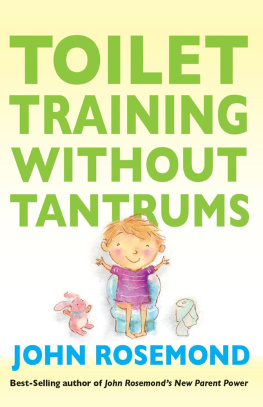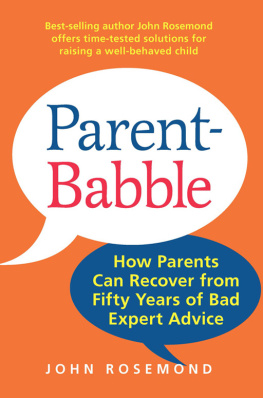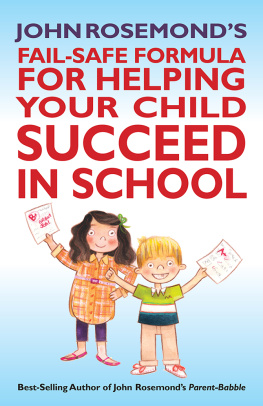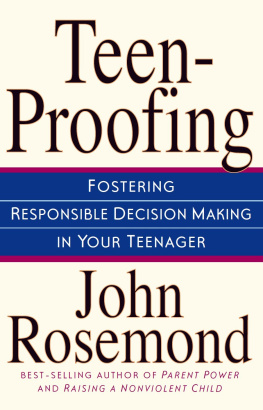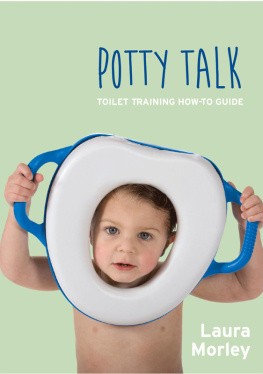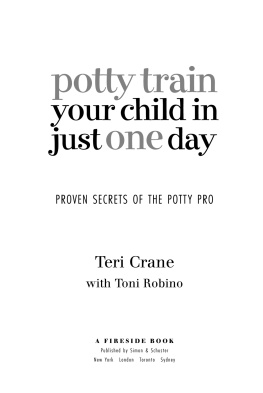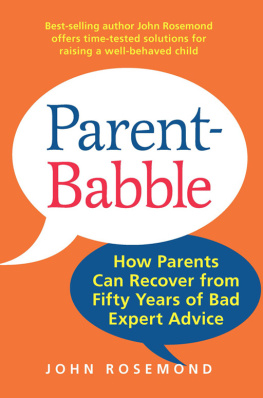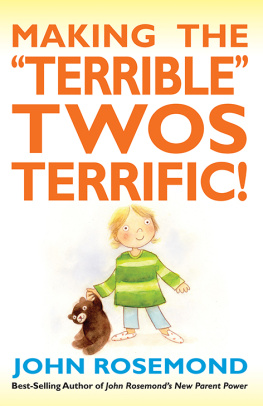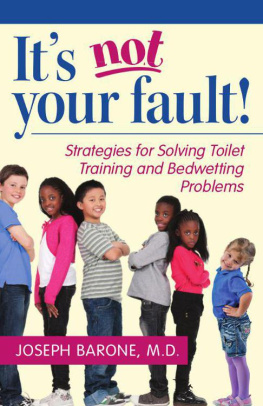CONTENTS
READERS GUIDE
Itried my best to keep this book short. After all, I am claiming thattoilet training is a simple, uncomplicated process. However, I alsothink that a historical overview of toilet-training advice and practicehelps put into proper perspective the general brouhaha that nowsurrounds the subject. To paraphrase philosopher George Santayana,those who do not understand the recent past are doomed to repeat it.
Chapters 1 and 2 provide that historical overview. I think it will behelpful for parents who are about to embark on this Great Adventureto know how the simple process of teaching a child to use the toiletbecame so completely messed up. But if you want to risk doom, youare free to skip the history and dive straight into the how-to material,Chapters 3 and 4. If you are struggling with a child three or older who isnot yet fully trained and may even be refusing to use the toilet, Chapter5 is your ticket. But please, regardless, read Chapters 3 and 4 first.
In Chapter 6, I lay out the pros and cons of what is being calledinfant elimination training or elimination communication (I preferthe former). Chapter 7 deals with bedwetting and what is erroneouslycalled night training. Chapter 8 really isnt a chapter. Its whats knownas a coda.
If youre in a hurry to get this over with, or youve alreadyexperienced as much difficulty as you can take, read Chapters 3, 4,and 5. If youre interested in the big picture and youre not Type A,read it all.
Thats it in a nutshell. Happy toilet training!
INTRODUCTION
In 2000, I added a question-and-answer feature to the membersside of my Web site at www.rosemond.com. Of the first thousandquestions submitted, close to 250one in fourdealt with someaspect of toilet training. Parents wrote in about children who werecompletely oblivious to the presence of a potty, were still havingfrequent accidents after three to six months of training, or just plainrefused to sit. If my membership was any indication, toilet training wasthe single most vexing, anxiety-arousing, stress-inducing, infuriating,guilt-ridden parenting problem of the preschool years.
Upon close examination, I discovered that in nearly everyproblem situation, parents had waited to begin training until well aftertheir children had turned two. I also could not help but notice that inmany instances, parents reported that they had waited until a childwas two-and-one-half, three, or even older because thats what theirpediatrician had told them to do.
Intrigued, I called a few pediatrician friendsones who advisedtraining before or around the second birthdayand asked them whyso many of their colleagues were dispensing this very bad advice toparents. The answer, in every case: Thats what pediatrician andparenting book author T. Berry Brazelton advises, and his advice hasbecome the pediatric standard when it comes to toilet training.
Id met Brazelton in the mid-1980s while attending one of hisseminars and knew that central to his toilet-training philosophy wasthe concept of readiness signs, a set of specific behavioral indicatorsthat a child was sufficiently maturephysically, intellectually, andemotionallyand could therefore control his eliminations, understandthe process, and handle its supposed psychological rigors. In fact,said seminar had made a convert out of me. For years, I chanted thereadiness-signs mantra in my newspaper column, books, and publicpresentations. During that time, however, I began researching thehistory of toilet training in America, talking to American parents whohad toilet trained children before age two, and talking to parents fromother countries where pre-two training was the norm. I slowly cameto the conclusion that the concept of readiness was largely hogwash.In 1999, in my nationally syndicated parenting column, I ate crow forhaving lent credibility to the notion:
QAs for the matter of readiness signs, I am now convinced thisis so much psychobabble. I apologize for ever giving parents theimpression that toilet training is a delicate issue that must be approachedwith a keen eye for signals from the child that he/she is psychologicallycapable of dealing with the requirements of the process.
AAt the same time, I began advocating a method of trainingthat I called Naked and $75. In part, Im sure, because of thecatchiness of the term, the media began giving me my fifteen minutesof fame. In a page 1 story,The New York Timesfavorably comparedmy toilet-training philosophy with Brazeltons. I was invited to guestonGood Morning America, 20/20, and NBCsLater Today. On onenational talk show, I debated a California pediatrician and Brazeltondisciple who insisted that training a child younger than two requiredundue force and was likely to result in great frustration, angst, andlong-term psychological harm. During the exchange, I speculated thatmy opponent, being of approximately the same age as me, was probablytrained before age two. I asked, Can you tell us what long-term harmyou suffered as a result? She looked like the proverbial deer in theheadlights. After a moment of surprised silence, she stammered thatindeed, her mother had told her shed been trained at eighteen months.However, she quickly added that the person who was actually trainedwas her mother, not her. She conveniently avoided answering the mostimportant aspect of my question: How had early (in fact, eighteenmonths was pretty much the norm fifty years ago) training caused herlong-term psychological harm? Needless to say, she would have beenunable to identify any such harm. My point was that objective evidenceof what Brazelton and his disciples are claiming is completely, utterlylacking. His claims qualify as hogwash.
I think Brazelton is a well-intentioned man who has caused a greatdeal of harm. With his very bad toilet-training adviceI call it toiletbabblehe tossed a huge monkey wrench into American parenting.His advice transformed something simple and straightforward intosomething complicated; something down-to-earth into somethingsupposedly fraught with apocalyptic psychological ramifications. Forhundreds of years, toilet training represented liberation for mothers. Theylooked forward to it. Since Brazelton began spreading his bad news, it hasbecome the parenting equivalent of a triple root canal without anesthesia.
Here are the facts about toilet training:
- It is a fundamentally simple process, not, as pediatrician andauthor William Sears claims, highly complex. He means itis complex for the child, but this definitely implies that toilettraining involves lots of complexity for the parent, as well,that she must be properly attuned to a host of practical andpsychological details and be constantly on her proverbial toes.
- Toilet training is no more fraught with psychologicalramifications than is teaching a child to feed himself with a spoonor tie his shoes.
- Its easiermuch easier, in factto toilet train a child before hisor her second birthday than after.
- Toilet trainings window of opportunity is widest betweeneighteen and twenty-four months of age.

